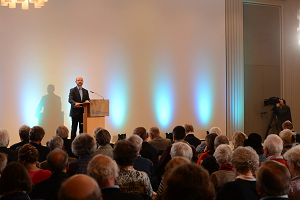“Islam in the Secular Constitutional States of Europe” – lecture by Mathias Rohe
Can Islam belong to Europe? This question cannot be answered in one sentence. In his evening lecture at the Bavarian Academy of Sciences, Prof. Rohe talked about the manifold streams of Islam. As jurisprudent and Islamic scholar, Rohe showed how these streams react to the parameters of European constitutional states. The panel was followed by an intense discussion with the audience. ARD Alpha recorded the lecture.
Religion has returned to the agenda of modern societies. Especially outside Europe, religious actors unfold an immense power of mobilization, but also create new conflicts. Religion can play a part in the inner integration of societies but can also strengthen tendencies of polarization between different groups of belief as well as justify the exclusion of the “others”. Not only in modern political Islam with its concepts of “Holy War” or “Islamic State”, but also in many other religious communities including different approaches of Christianity, religious violence can be envisioned.
The normative conflict that religious belief provokes in times of modernity includes tensions between religion and secular knowledge systems, e.g. the elementary antagonisms between certainty of faith and scientific rationality. By institutionalizing freedom of religion as a basic right antecedent to the state, the liberal constitutional state enables the free unfolding of different religious interpretations of the world and orientation systems, but also gives room to religious actors that question the legitimacy of a state’s legal system due to their “divine law”. In accordance, the tensions between religion and positive law have in many societies increased dramatically since the 1980s. In a large-scale lecture series from 2015 until 2017, the Bavarian Academy of Sciences haunts the high amount of new religious conflict dynamics of today. The dark sides of religious appreciation are to be explored just as the quick self-assertion of new charismatic Christendoms, as well as the contrasting tendencies of erosion in the classical churches and the fascination of alternative offers of sensemaking such as esoterism.
